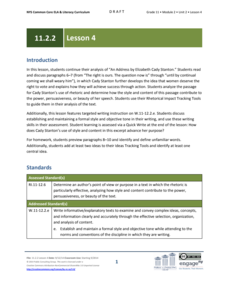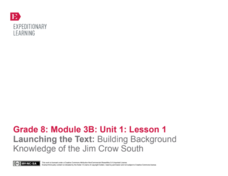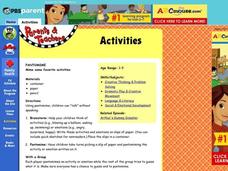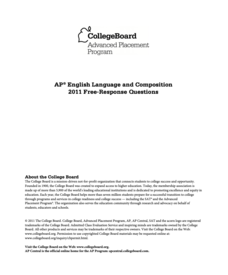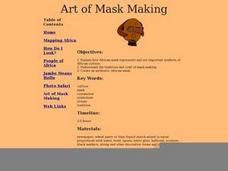EngageNY
Grade 11 ELA Module 2: Unit 2, Lesson 3
What is the distinction between rights and equality? Scholars continue their analysis of "An Address by Elizabeth Cady Stanton" using the third instructional activity from the 14-part Grade 11 ELA Module 2: Unit 2 series. Pupils complete...
EngageNY
Grade 11 ELA Module 2: Unit 2, Lesson 4
How does style contribute to the power and persuasiveness of a speech? With the question in mind, scholars continue reading "An Address by Elizabeth Cady Stanton." They complete a Rhetorical Impact Tracking Tool to guide them in their...
EngageNY
Grade 11 ELA Module 2: Unit 2, Lesson 5
Elizabeth Cady Stanton compares sins to monsters, using a metaphor to make a point about morality. Using the fifth of 14 lessons from the Grade 11 ELA Module 2: Unit 2 series, learners analyze paragraphs 8-10 of "An Address by Elizabeth...
EngageNY
Grade 11 ELA Module 2: Unit 2, Lesson 7
Joan of Arc, Mother Teresa, Rosa Parks ... many inspirational women have paved the way for future generations, and Elizabeth Cady Stanton is no exception. Scholars continue reading and analyzing "An Address by Elizabeth Cady Stanton."...
EngageNY
Grade 11 ELA Module 2: Unit 2, Lesson 8
Using the resource, pupils consider how the author structures her argument in "An Address by Elizabeth Cady Stanton." Scholars complete a written response to identify one of Cady Stanton's claims and analyze how she uses reasoning and...
EngageNY
Analyzing Experiences: Carlotta Walls
What was life like in the American South following the Civil War? Scholars watch a video that discusses the aftermath of the Civil War and the events during the Reconstruction Period. Additionally, they continue reading Carlotta Walls...
EngageNY
Launching the Text: Building Background Knowledge of the Jim Crow South
Pictures and photographs help build background knowledge about a topic. Scholars participate in a gallery walk to learn more about the Jim Crow era of US history and the desegregation of schools following Brown v. Board of Education....
Curated OER
Pantomime
There's no doubt that dramatic play and creative movement are both essential for a healthy early childhood education. Here is a lesson that promotes both. Youngsters think of activities and emotions. The words are written on pieces of...
Curated OER
Fable Writing - Interdisciplinary Approach to Social Sciences
Before writing their own fables, class members select an animal or insect to use in their story and research its character, habits, movements, etc. After reading a wide variety of fables and identifying the elements of a fable, writers...
Curated OER
Phoneme Segmenting Accuracy
Take your kindergartners on a journey to the mythical planet Paz where residents segment words into phonemes, touching parts of their arm with each sound. This physical response to phoneme segmenting will appeal to your physical learners...
Curated OER
Reintroduce /e/
These inventive strategies help emerging readers focus on the letter e, forming sound associations along with letter recognition. Explain the mouth movement in making the /eee/ sound, asking learners to try it. Can they think of words...
Curated OER
What is Romanticism?
Blake, Wordsworth, Shelley, Coleridge, Byron, Keats. The Romantic Era and the ideas that accompany the movement are the focus of a PowerPoint that examines the lives and works of these British writers. Richly-detailed lecture notes...
Literacy Design Collaborative
Author Study: Kate Chopin
Four stories by Kate Chopin offer high schoolers an opportunity to demonstrate their understanding of the ways authors use various literary elements and movements to develop their themes and social commentaries.
EngageNY
Reading Closely and Introducing Rhetoric Toolbox: Unions as Agents of Change—Part 1
Scholars explore the question of whether labor unions are the agents of change as they continue reading César Chávez's 1984 speech, "Address to the Commonwealth Club of California." They discuss rhetoric in Chávez's speech and discover...
Prestwick House
Discovering Genre: Poetry
Work on literal and figurative meanings with a instructional activity focused on Robert Frost's "After Apple-Picking" and "The Road Not Taken." Readers identify the literary devices used by the poet to set the poems' themes,...
College Board
2011 AP® English Language and Composition Free-Response Questions
Mammals can be carnivores, omnivores, and herbivores, but what about locavores? A set of free-response questions from the 2011 AP® English Language and Composition exam introduces test-takers to the term, which describes people who try...
Orlando Shakes
To Kill a Mockingbird: Study Guide
Who was Harper Lee, and what led her to write one of the most celebrated novels of all time? Scholars learn about the author of To Kill a Mockingbird and read a summary of a dramatic production of the novel. They also discover the...
Curated OER
Activity Plan Mixed Ages: Do the Animal Dance!
Young scholars create a dance based on animal movements. In this kinesthetic lesson plan, the students will read and imitate animals in a creative way and share their dances with the group. The lesson plan includes a take-home activity...
Curated OER
Interdisciplinary Lesson Plan
Third graders study Thanksgiving. In this physical education and spelling lesson, 3rd graders play a race game by being the first group who can spell the word Thanksgiving first.
Curated OER
Art of Mask Making
Students make an African mask. In this culture and heritage lesson, students view samples of African masks and learn about the importance of these masks. Students visit the African Art Museum website to view the styles of...
Curated OER
Art -- The Secret to Freedom
Fourth graders create a coded message in a quilt. In this art activity students demonstrate the communication used by the Underground Railroad. Students work in a group to make a quilt with a code in it.
K12 Reader
Civil Rights Word Search
Invite your class to brush up on their civil rights terminology by assigning this word search. Class members must find and circle 19 terms in the puzzle.
Curated OER
Research, Writing, and the 'Isms'
Students research an art style. They create an original short story, poem, or personal essay and illustrate the written work with the style of art they researched.
Oglebay Institute
Post-Impressionism: Mosaic Still-life
A still life with tissue paper? Why not! Using Paul Cézanne's art as inspiration, learners create their own still life pictures by gluing various colors of tissue paper onto a paper or pattern.
Other popular searches
- Art Movements Timeline
- Modern Art Movements
- Art Movements Salvador Dali
- Art Movements Time Line
- Art Movements Pop Art
- 20th Art Movements
- Visual Arts Art Movements
- 20th Century Art Movements

